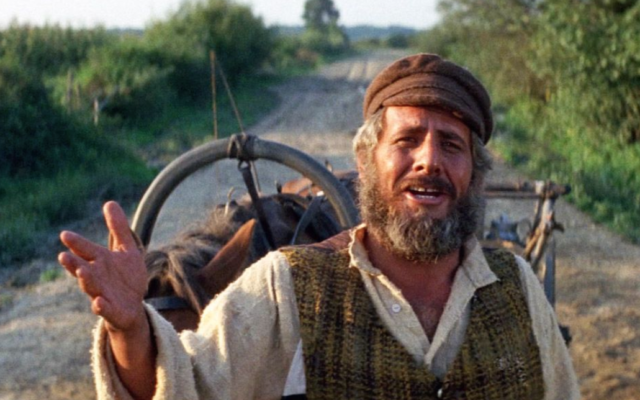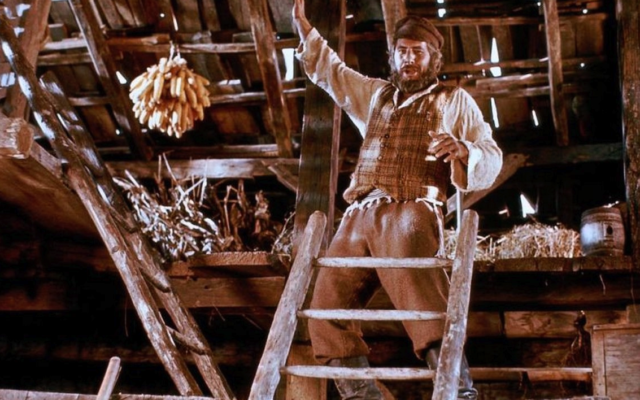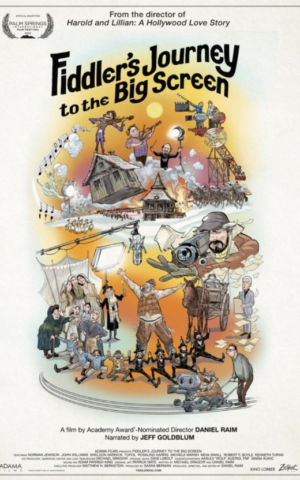Topol Dies at 87 but Leaves a Timeless Legacy
As Tevya in the film, “Fiddler On The Roof,” Chaim Topol created a powerful and enduring character.

Chaim Topol, the Israeli actor who died March 9 at the age of 87, who gained international stardom as Tevya, the milkman in the 1971 film, “Fiddler On The Roof,” turned down his first chance to play the role. Originally, he was asked to play Tevya in the 1965 Hebrew language version of the musical when it was produced in Tel Aviv.
It was a role that had been created on Broadway by Zero Mostel, who played Tevye in the broad, comic style he was known for. But as documentary producer Daniel Raim tells it, Topol had another vision of the character. He had gained it listening to his father, who grew up with the original stories by Sholom Aleichem which inspired the musical. Raim interviewed Topol in Tel Aviv in 2009.
“As Topol tells the story,” Raim recalls, “listening to stories that his father recited from memory he really became immersed in that insular world and loved it all. When he first saw Zero Mostel playing Tevye, on Broadway, he was not moved by the production. He was not in(to) playing that Tevye.”

The role in that Tel Aviv production he turned down, instead, was taken by the well-known Israeli actor of Russian heritage, Shmuel Rodensky, who made Tevye into a thoughtful but still humorous character, beset by all the problems of early 20th century Eastern European shtetl life. It was a revelation to Topol, who then jumped at the chance to fill in for Rodensky for 10 weeks when the actor became ill.
Eventually, he was asked to audition for the role in the original West End production in London in 1967. Although he was only in his early 30s when he tried out and had to learn the songs in English phonetically because he didn’t speak the language, producer Harold Prince hired him. The original director of the Broadway production, Jerome Robbins, worked with the Israeli actor to create an alternative to the Mostel creation while it retained much of the warmth and humor of the Broadway production. The British show ran for more than 2,000 performances and in October 1971, on the closing night, Hollywood director Norman Jewison came to London to see the show. Filmmaker Raim, who directed the documentary about the making that was shown at last year’s Atlanta Jewish Film Festival, described Topol as having no idea he was being considered for the role.

“Topol had no idea that Norman Jewison was coming backstage to meet him afterwards. And he told me, his first thought was how incredibly honored he felt when Norman wanted to meet him, how he was surprised when he was told he would star in the film. He thought about the bittersweet back story of his own family that came from the shtetls in Russia and now, he was going to tell their story to the world. So, it was powerful to hear all of this from him, in person and then finally, years later, to develop it into the documentary that I did “Fiddler’s Journey to the Big Screen.”
Topol was a risky choice, according to Emory University film professor Matthew Bernstein, who was also the executive producer of Raim’s documentary. When Walter Mirisch, whose company produced the film, was a guest at Emory in 2010, he told Bernstein and his students the decision was a difficult one.
“Mirisch said (that was) probably the most consequential casting decision he made in his long career,” Bernstein said, “not to cast Zero Mostel and to go with Topol. For some people, it’s hard to get over the fact that Zero Mostel didn’t play the role. But if you get over that, Topol’s marvelous. He has a certain kind of strength, a certain resilience. He embodies all these wise, wonderful questioning, and stubborn characteristics of Tevye that really brings him to life.”
For the film, Topol, who was only 36 at the time, had to age by 20 years and was made to look 30 pounds heavier with costuming and make-up. He’s said to have “locked his muscles” as he described it to give Tevye the more measured pace of an older man. For his performance, he won a Golden Globe for Best Actor and was nominated for an Academy Award. For 20 years after the film premiered, he was the most famous Israeli actor in the world. His performance not only symbolized the tough life of a shtetl Jew in Eastern Europe, but the toughness and resourcefulness that characterized a new generation of Israeli Jews.
In the film when he tells a Russian Czarist official, through barely clenched teeth, “Get off my land,” he was speaking for more than himself.
Upon Topol’s death, the president of Israel, Isaac Herzog, said in a statement that he “filled the cinema screens with his presence and, above all, deeply entered our hearts.”



comments